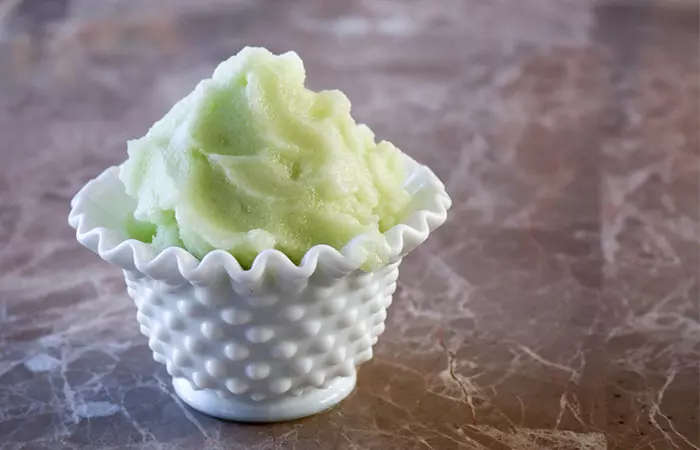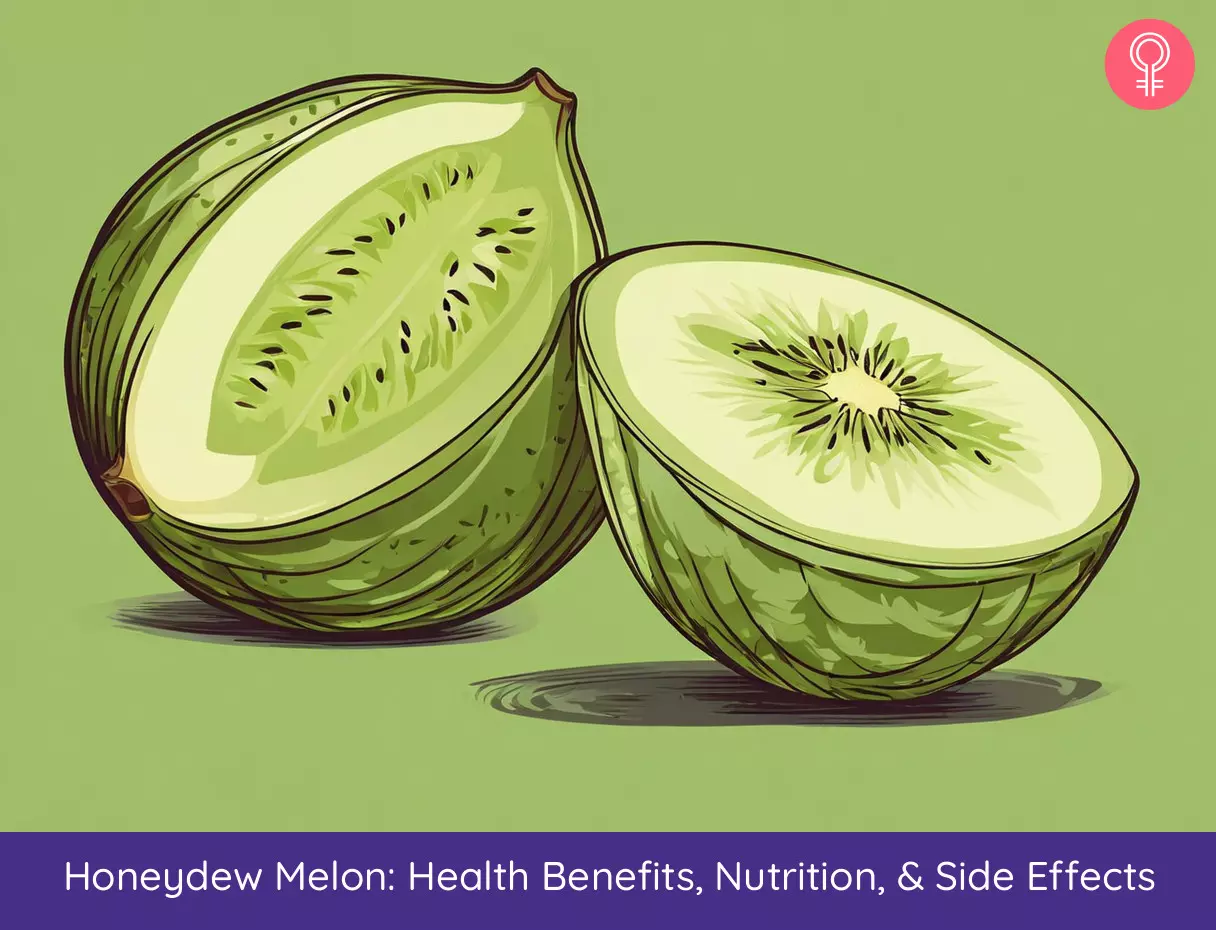What Do Honeydew Melons Taste Like?
Honeydew melons have a sweet, subtle fruity-floral taste. Their degree of sweetness depends on the variety. A fully ripe honeydew melon is sweeter, juicier, and has a soft texture (not mushy). On the other hand, an unripe honeydew melon may taste a bit bland, has a crunchy texture, and a strong musky aftertaste, which reduces a bit when the fruit is fully ripe. It is perfect for snacking and is loaded with nutrients. Let’s take a look at its nutrient profile. Kassie, a Youtuber, shared her personal experience with tasting a honeydew melon for the first time and how much she relished the sweet flavor. She states in her video, “That is candy, this is nature’s candy (i).” She further shares, “But this is very very good and it is so sweet and sugary that my fingers are getting sticky the way that they get when I’m eating a mango, like when I’m eating a good mango.”
Honeydew Melon Nutrition Facts
According to the U.S. Department of Agriculture, 100 grams of raw honeydew melon contain (1):
Calories: 36 Protein: 0.54 g Fat: 0.14 g Carbohydrate: 9.09 g Fiber: 0.8 g Sugar: 8.12 g Calcium: 6 mg Iron: 0.17 mg Magnesium: 10 mg Phosphorous: 11 mg Potassium: 228 mg Sodium: 18 mg Zinc: 0.09 mg Copper: 0.024 mg Manganese: 0.027 mg Selenium: 0.7 µg Vitamin C: 18 mg Riboflavin: 0.012 mg Folate: 19 µg
Honeydew melon is also rich in carotenoids and polyphenolsi Organic compounds of the phenol group that naturally occur in plants and provide defense against ultraviolet radiation. , making it a healthy food option. Scroll down to learn more about its health benefits.
8 Health Benefits Of Eating Honeydew Melon
Honeydew melon is low in sodium and high in potassium (1). A review published in Plants suggests that the high water and mineral content in melons can help reduce blood pressure (2). From studies, a high intake of fruits and vegetables is linked with a reduced risk of high blood pressure (3). In addition, reduced sodium consumption and increased potassium intake can help control blood pressure (4). Your body can become dehydrated when you lose more water than you consume. Honeydew melon contains about 90 percent of water (1). Studies suggest that the high potassium in honeydew melon helps with electrolyte balance in the body (5). The water and potassium content in honeydew melon helps in maintaining hydration. Honeydew melon is rich in carotenoids such as lutein and zeaxanthin, which help promote vision health (1). Lutein plays a key role in vision performance and reduces the risk of age-related macular degenerationi A disease that causes damage to the retina of the eye and results in blurred or reduced vision in people between the age of 50 and 60. , which is a leading cause of vision impairment and blindness (6), (7). A review published in nutrients suggests that these carotenoids act as blue light blockers and prevent damage by free radicals (8). The carotenoids and polyphenols in honeydew melon possess antioxidant and anti-inflammatory properties. They help reduce cholesterol levels, and blood pressure, and help treat and prevent cardiovascular disease (9). In addition, the folate and other vitamins in the melon offer protection against stroke (10). Honeydew melon is rich in vitamin C and carotenoids that boost skin health. Vitamin C can stimulate collagen production and offer protection against UV-induced photodamage (11). This potent antioxidant can help prevent photoagingi Premature aging of the skin that is characterized by dark spots and fine lines due to prolonged exposure to solar radiation. and aid in the treatment of hyperpigmentationi A condition in which the skin produces excess melanin and causes darkened spots and patches on the skin. (12). However, more studies are needed to understand the benefit of honeydew melon in humans. Insufficient Evidence For In addition, the carotenoids in honeydew melon may help reduce the risk of cancer (18). Are there any adverse effects associated with excess intake of honeydew melon? Scroll down to find out.
Side Effects Of Honeydew Melon
Intake of honeydew melon in moderation is considered safe. However, excess consumption may lead to several side effects. These include digestive issues like diarrhea or elevated blood sugar levels. Honeydew melon may also cause allergic reactions in a few people. However, little research is available on these side effects. If you develop mouth itching, rash, hives, cramps, trouble breathing, and nausea after consumption of honeydew, stop intake and consult your doctor. In general, symptoms will develop right after eating honeydew. Are honeydew melon and cantaloupe the same? If not, how are the two different? Learn more in the next section.
Honeydew Melon Vs. Cantaloupe
While honeydew melon and cantaloupe have many similar qualities, they have some differences too. Honeydew melon has a smooth, light-colored rind with green flesh. Cantaloupe is dark and netted with orange flesh. Honeydew is sweeter with firm flesh, while cantaloupe has softer flesh. Cantaloupe is more likely to get contaminated due to its netted rind. Cantaloupe is a richer source of vitamins A and C than honeydew (1), (19). However, they are both nutritionally-packed fruits. There are many benefits of cantaloupe as well as honeydew melon. They can be a great addition to any balanced diet.
How To Store Honeydew Melon?
Honeydew melons will last for about two weeks if stored at room temperature. Leftovers, if stored in the refrigerator, can look fresh for four to five days. You can also store them in the freezer where they may stay fresh for ten to twelve months. Are you wondering how to eat this oval-shaped fruit? Check out the next section to learn how to prepare honeydew melon.
How To Prepare Honeydew Melon?
You can prepare honeydew melon in the following ways. (Or) You can also try this method: You can prepare delicious yet simple honeydew melon recipes at home. Scroll down to find out more.
Honeydew Melon Recipes
1. Honeydew Melon Sorbet
What You Need
Honeydew Melon – 1 Honey – ¼ cup
Process
2. Honeydew Melon Smoothie
What You Need
Chopped honeydew melon – 2 ½ cups Coconut milk – 1 cup Matcha – 1 teaspoon Cinnamon – 1/8 teaspoon Lime zest and lime juice – ¼ teaspoon, each
Process
3. Honeydew Melon Jam
What You Need
Honeydew melon – 1 Sugar – 2 tablespoons Pure lime juice – 2 tablespoons
Process
Conclusion
Honeydew melon is a pale green fleshed sweet fruit with white or yellow rind. It is rich in a wide variety of vitamins and minerals, fiber, and plant compounds. The presence of these nutrients in honeydew melon benefits your health in a multitude of ways. From reducing blood pressure to supporting healthy skin, honeydew melon helps maintain optimal health. It can be eaten alone or as an ingredient in salads, soups, or smoothies. However, excess intake of honeydew melon has some side effects. Hence, consume it in moderation and consult your doctor in case of any emergencies. Is honeydew good for your stomach? The presence of water in honeydew melon helps facilitate smooth and easy bowel movements. It also eliminates acidity and improves digestion (19). In addition, the presence of fiber in this melon may help improve digestive health and constipation. Does honeydew help with bloating? Anecdotal evidence suggests that the fiber and other nutrients in honeydew melon help with bloating. Being low in calories it is also weight loss friendly food. However, limited data is available in this regard. Is honeydew melon acidic or alkaline? Honeydew melon is mildly acidic.
Illustration: Honeydew Melon: Health Benefits Nutrition & Side Effects
Uncover the incredible health benefits of honeydew in this enlightening video. From hydration to digestive health, this delicious fruit has much to offer. Watch now and incorporate honeydew into your healthy lifestyle today.












